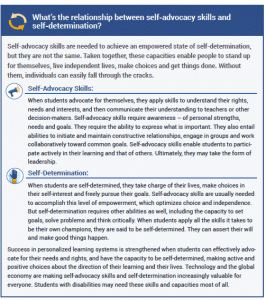What’s New: Three Great Resources
CompetencyWorks Blog

There are so many valuable reports and books being produced it is definitely hard to keep up (and CompetencyWorks is adding to the challenge, as we are releasing one report per month through June – each one rich with ideas and insights).
In this What’s New about Competency-Based Education, we are highlighting three resources very much worth your time to read or at least skim.
1. Agents of Their Own Success: Self-Advocacy Skills and Self-Determination for Students with Disabilities in the Era of Personalized Learning by the National Center for Learning Disabilities
2. From Vision to Reality: Personalized, Competency-Based Learning for All Kids by Virgel Hammonds and Jesse Moyer, KnowledgeWorks
3. Communicating Personalized Learning to Families and Stakeholders: Terminology,Tools and Tips for Success by Karla Phillips, ExcelinEd, and Amy Jenkins, Education Elements
Agents of Their Own Success: Self-Advocacy Skills and Self-Determination for Students with Disabilities in the Era of Personalized Learning is a must read for two reasons. First, it helps to make the connection between the concepts of self-advocacy and self-determination in the world of supporting students with disabilities, with the language of student agency used frequently in personalized learning and competency-based education. I’m sure there are nuances given that the context and how the concepts developed will be different. But we all take a big step forward in being able to understand how self-advocacy and self-determination can clarify our understanding of agency. For example, student agency refers to a student managing their education. Self-advocacy and self-determination are broader, with a focus on navigating one’s life in multiple environments.
Second, the ideas of self-advocacy and self-determination will help deepen our understanding of agency. We need to totally embrace them within the concept of agency. Too many schools have interpreted student agency as choice (between books or playlists), voice (in expression and co-designing projects), and leadership (participating in governance). However, agency actually requires a set of critically important skills that are packaged together under Turnaround for Children’s Building Blocks for Learning, such as growth mindset, self-regulation and other social & emotional skills, metacognition, and perseverance. Students need to be coached in skills and have opportunities for practice.
From Vision to Reality: Personalized, Competency-Based Learning for All Kids provides great insights into how leaders can help their communities identify their “why” for shifting to personalized, competency-based learning; how to create and implement the vision for personalized opportunities across an entire system; and how to understand and navigate state education policy. The paper encourages leaders to look beyond their current group of incoming students and consider what they must do to prepare the next generation of learners for the future. It’s a good paper to read if you are thinking about how to begin to engage people in your community with lots of questions that can be used to get folks thinking about the changing world, why personalized, competency-based systems make sense, and initial first steps in building a vision for going forward.
Communicating Personalized Learning to Families and Stakeholders: Terminology,Tools and Tips for Success summarizes the great research that Excellence in Education has been doing on how to communicate about personalized learning, combined with resources from Ed Elements. There is a quick, clear definition of what it takes to personalize learning: student reflection and ownership, targeted instruction, flexible content and tools, and data driven decisions. I highly recommended reading this to get up to speed on what Excellence in Education is finding works and doesn’t work in talking about personalized learning. (You won’t find much directly about competency-based education because their finding was don’t talk about CBE, talk about personalized education. We still need to do our message testing to talk about some of the big changes that districts and schools often undergo in implementing CBE and that go beyond personalizing learning, such as grading and multi-age bands. I do believe helping people understand the learning sciences will help them understand why change is needed.)